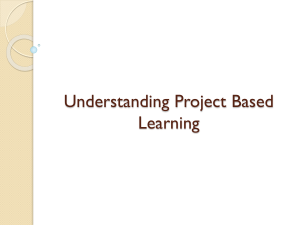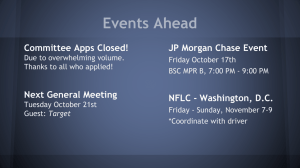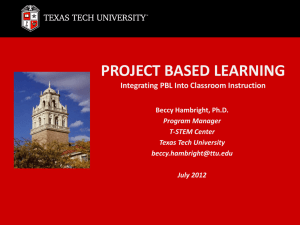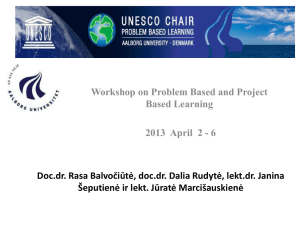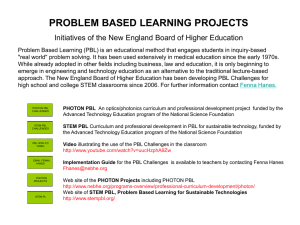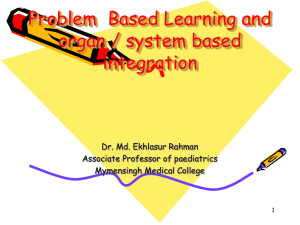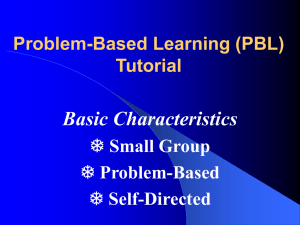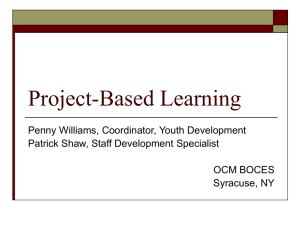presentation
advertisement
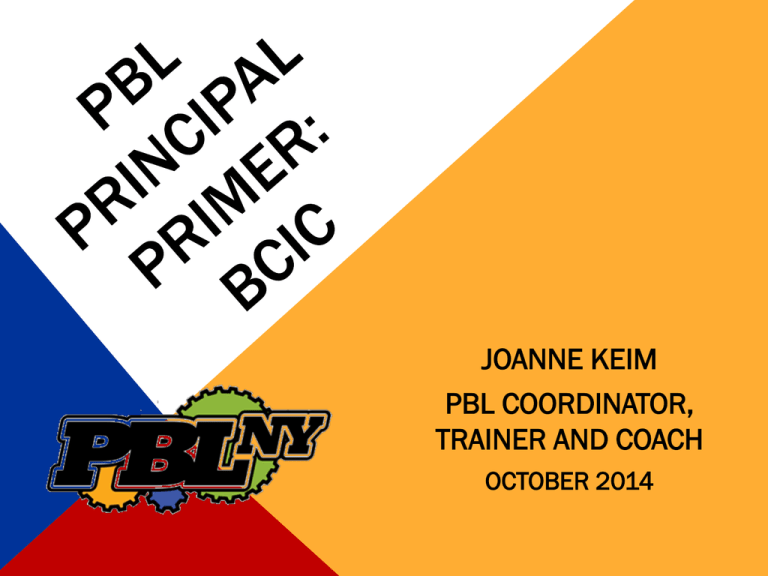
JOANNE KEIM PBL COORDINATOR, TRAINER AND COACH OCTOBER 2014 ENTRY DOC What does this tell us about how we prepare our students for their future? DRIVING QUESTION How can we, as administrators, support our teachers as they plan and implement authentic and rigorous Project Based Learning experiences that are meaningful for our students? THE WORLD HAS CHANGED! Picture courtesy of P. Shaw Jobs that Did NOT Exist 15 Years Ago • • • • • • • • • Social Media/Online-Community Manager 3D Animator and Technician Educational Consultant Blogger Sustainability Manager Search Engine Optimization Specialist Online Advertising Manager Elder Care Services Coordinator Medical Biller/Coder Forbes.com The Ideal Graduate a 21st Century Learner How can we best prepare students to be ready for their future not our past? What if all students. . . • • • • • • • • Were motivated? Were engaged? Were ready for college and career? Earned some college credit? Could communicate? Could collaborate? Thought critically? Creatively solved problems? Teaching that Engages Culture that Empowers Technology that Enables Standards Professional Practice PBL as a Regional Vision for 60,000 Students Data Culture BIE.ORG THE BUCK INSTITUTE OF EDUCATION DEFINES PBL . . . “as a systematic teaching method that engages students in learning knowledge and skills through an extended inquiry process structured around complex, authentic questions and carefully designed products and tasks.” PBL IS NOT A DESSERT PBL IS NOT THE PROJECT AT THE END OF A UNIT New Tech Network NEW YORK STATE LONG HOUSE The Common Core is the WHAT PBL is the HOW PBL is the MAIN COURSE – PBL is the UNIT New Tech Network CALIFORNIA MISSION PROJECT BIE.org Dear Keepers of the Missions of Alta California, The church is eager to establish another mission, the 22nd, after we build the one now being planned for Sonoma. Please tell us exactly where you think the mission should be located and what it should look like. When you present your ideas, explain how the mission will help meet our urgent goals for this part of the world. With gratitude, Archbishop Fonte Mexico City, 10 June 1818 BIE.org “8 ESSENTIALS FOR PROJECT-BASED LEARNING” Educational Leadership Article: John Larmer, John R. Mergendoller, Ph.D. Buck Institute for Education ENTRY DOC What does this tell us about how we prepare our students for their future? DRIVING QUESTION How can we, as administrators, support our teachers as they plan and implement authentic and rigorous Project Based Learning experiences that are meaningful for our students? WHAT DO YOU NEED TO KNOW ABOUT PBL? Need to Know • Seamlessly embedded in the project • One or two are taught and assessed Collaboration Communication Creativity Critical Thinking The PBL Inquiry Process Students make choices, independently and collectively, to express their learning based on their interests, values, or beliefs. BIE.org CRITICAL FRIENDS TUNING PROTOCOL PRESENTERS Presentation: Project Title & Idea, Driving Question, Culminating Products or Performances, Entry Event*, and any concerns you’d like feedback about 5 min EVERYONE Clarification: Audience asks short clarifying questions 2 min AUDIENCE Good Stuff: Audience shares what they liked about the project 2 min Wondering Stuff: Audience shares their concerns and probing questions 2 min Next Stuff: Audience shares their thoughts on resources and improvements 2 min Reflection: Group reflects on useful feedback, next steps 2 min PRESENTERS TOTAL TIME 15 min BIE.org ASSESSING PROJECTS ARTICULATE A SHARED VISION Seapointcenter.com DEVELOP A PBL CULTURE BIE.org CREATE AN ACTION PLAN BIE.org COMMUNICATE THE BENEFITS OF PBL Reinforce content retention Deepen understanding Multi-sensory instruction Teaches skills in cooperation and collaboration • Alternate means of assessing students' progress • Student engagement at its best • • • • Jerry Webster, specialed.about.com LAUNCH PBL TO THE FACULTY AND STAFF 1. Generate Interest and Excitement and “The Why” • Entry Event • Driving Question • Need to Know • Shared Vision 2. Implementation Plan – “The What and How” • Training and Coaching • Administrative Support PBL ADMINISTRATOR TRAINING 401-Bringing PBL to Scale • understand the eight essential elements of a project • develop a shared PBL vision (district and/or building) • assess the current district/school culture • generate an action plan for district-wide or school-wide PBL implementation, which includes scheduling training and coaching –or– create an action plan to support teachers who have been trained in PBL 101 403-Evaluating Teacher Performance in a PBL Classroom 402-Creating a Supportive PBL School Culture • • assess the current district/school culture collect evidence found in a project using the district rubric • develop coaching strategies to use during pre- and postconferences to strengthen PBL and standardsbased education practices • use rubrics and protocols in designing high-quality projects and creating a classroom culture of inquiry and critique • practice using teacher reflection strategies to improve student learning • make connections between the NYS Teaching Standards and PBL generate an action plan to: establish collaborative inquiry and critique examine student work and critiquing projects (DDI/RTI) • • determine strategies for involving parents and the community Prerequisite PBL 401 Prerequisite PBL 401 Joanne Keim jkeim@ocmboces.org @ jkeim11 #pblny
